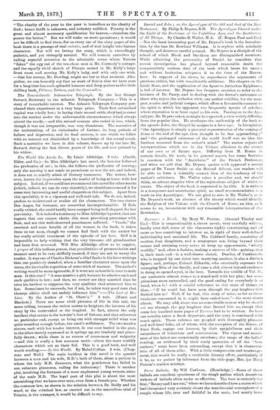The World She Awoke In. By Lizzie Alldridge. 3 vols.
(Smith, Elder, and Co.)—In Miss Alldridge's last novel, the heroine followed the profession of art ; in this, she follows the profession of nursing; only the nursing is not made so prominent as was the art, and indeed, it does not so readily admit of literary treatment. The writer, how- ever, leaves the impression upon the reader of being at home with her subject. Indeed, if we could not recommend this novel for other merits (which, indeed, we can do very sincerely), we should recommend it for some very interesting and useful chapters on this subject. Apart from this speciality, it is a vigorous and well-told tale. We do not, indeed, profess to understand or realise all the characters. The two sisters Des Anges, for instance, are somewhat incomprehensible. If Eula really existed, she could hardly have escaped being well slapped, for her perversity. It is indeed a testimony to Miss Alldridge's power, that one regrets that one cannot clothe this most provoking personage with flesh, and see this well-deserved punishment inflicted. "Vessie," the sweetest and most lovable of all the women in the book, is taken from us too soon, though we cannot find fault with the author for her really artistic treatment of the episode of her love. Still it is impossible to help wishing that the very tiresome old grandmother had been first removed. Will Miss Alldridge allow us to suggest, d propos of this tedious person, that peculiarities of pronunciation and manner need to be very skilfully treated, if they are not to weary the reader. It was one of Charles Dickens's chief faults in his later writings that one positively dreaded, when a familiar character came upon the scene, the inevitable repetition of some trick of manner. The anther's writing would be more agreeable, if it were not so hostile in tone to male man. Is this true? "A man marries a girl, because he admires such and such qualities in her ; and then, no sooner are they married than he tries his hardest to suppress the very qualities that attracted him to her. Sometimes he succeeds, but if not, he takes very good care that thesequ alities shall not unduly influence him."—The Last of Her Line. By the Author of "St. Olave's." 3 vols. (Hurst and Blackett.) There are some vivid pictures of life in this tale, the more telling, because the writer scorns to heighten the interest of his story by the unrevealed or the tragical. In fact, almost the only incident that occurs is the heroine's loss of fortune, and that subserves no particular end, except to bring out with stronger relief what was quite manifest enough before, her aunt's selfishness. The two maiden
sisters, each with her tender interest, in one case buried in the past, in the other sternly repressed as it springs up, are tenderly and grace- fully drawn ; while there is no excess of coarseness and vulgarity —and this is really a less common merit—about the more worldly characters which act as their foil. This is a good book, and well
worth reading.—In this World. By Mabel Collins. 2 vols. (Chap-
man and Hall.) The main incident in this novel is the quarrel between a man and his wife, M.D.'s both of them, about a patient in whom the lady M.D. discovers, what the gentleman has failed to see, subacute glaucoma, calling for iridectomy ! There is another plot, involving the fortunes of a most unpleasant young woman, niece of the male M.D. The legal part of this plot is about the most astonishing that we have ever seen, even from a female pen. Whether the common law, as shown in the relation between Dr. Doldy and his ward, or the criminal law, as carried out in the marvellous trial of Yriarte, is the stranger, it would be difficult to say.


































 Previous page
Previous page